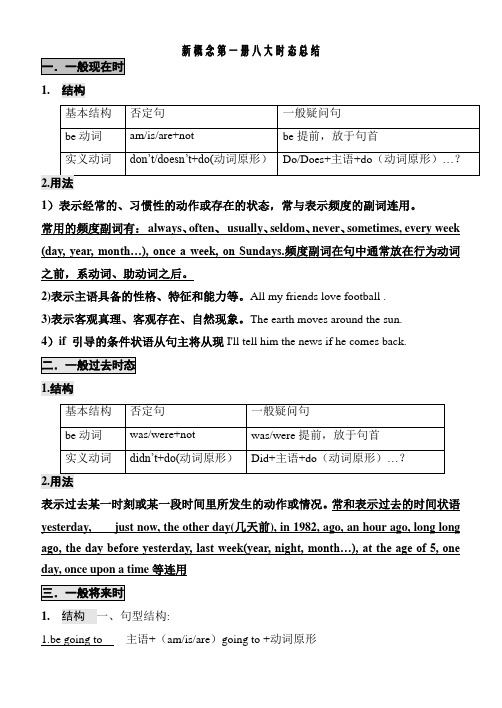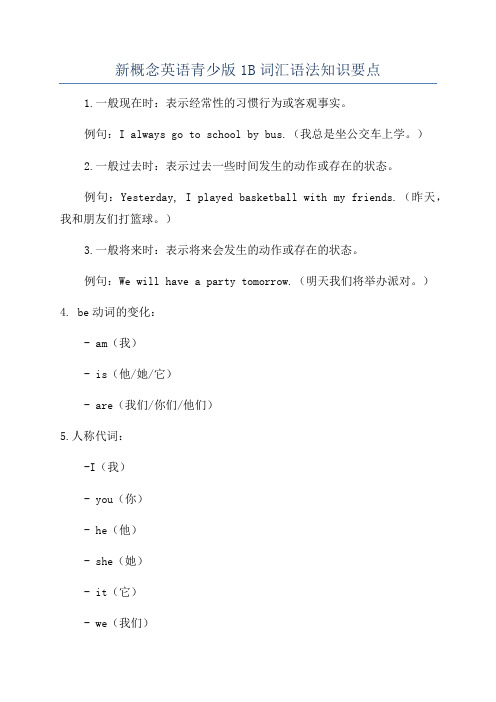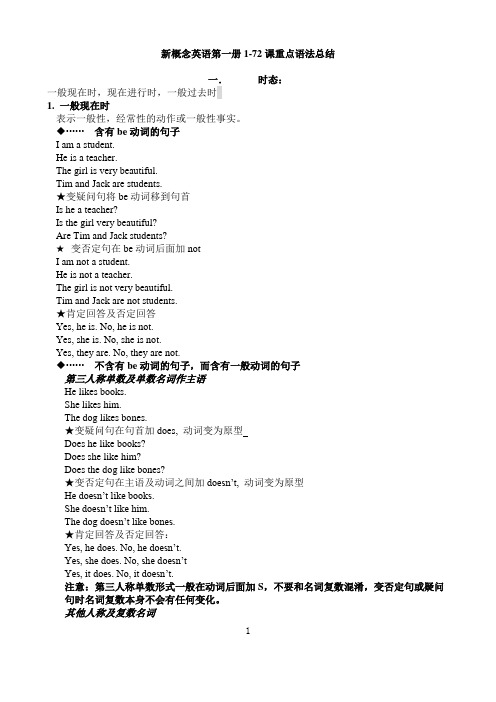新概念英语1B全册句型总结
完整版)新概念英语1B知识点总结

完整版)新概念英语1B知识点总结In Unit 16 of New Concept English 1B。
we learn about the "There be" XXX.The "There be" sentence pattern is used to express the existence of a person or object in a XXX singular nouns。
we use "There is" + the noun + in/at/on + the place。
For plural nouns。
we use "There are" + the noun (in plural form) + in/at/on + the place。
It's important to note that "There be" expresses existence。
while "have" and "has" express ownership.To form a negative sentence。
we add "not" after "There be" and before the subject。
For example。
"There are not any students in the classroom." To form a n。
we use the auxiliary verb "be" before "there"。
For example。
"Are there any children in the classroom?" XXX is "Yes。
新概念英语第一册时态总结+练习

新概念第一册八大时态总结一.一般现在时1.结构基本结构否定句一般疑问句be动词am/is/are+not be提前,放于句首实义动词don’t/doesn’t+do(动词原形)Do/Does+主语+do(动词原形)…?2.用法1)表示经常的、习惯性的动作或存在的状态,常与表示频度的副词连用。
常用的频度副词有:always、often、usually、seldom、never、sometimes, every week (day, year, month…), once a week, on Sundays.频度副词在句中通常放在行为动词之前,系动词、助动词之后。
2)表示主语具备的性格、特征和能力等。
All my friends love football .3)表示客观真理、客观存在、自然现象。
The earth moves around the sun.4)if 引导的条件状语从句主将从现I'll tell him the news if he comes back.二.一般过去时态1.结构基本结构否定句一般疑问句be动词was/were+not was/were提前,放于句首实义动词didn’t+do(动词原形)Did+主语+do(动词原形)…?2.用法表示过去某一时刻或某一段时间里所发生的动作或情况。
常和表示过去的时间状语yesterday, just now, the other day(几天前), in 1982, ago, an hour ago, long long ago, the day before yesterday, last week(year, night, month…), at the age of 5, one day, once upon a time等连用三.一般将来时1.结构一、句型结构:1.be going to 主语+(am/is/are)going to +动词原形2.will :主语+will+动词原形(will为助动词,与情态动词用法相同,与动词原形构成谓语,不需要根据人称进行变化。
新概念英语青少版1B词汇语法知识要点

新概念英语青少版1B词汇语法知识要点1.一般现在时:表示经常性的习惯行为或客观事实。
例句:I always go to school by bus.(我总是坐公交车上学。
)2.一般过去时:表示过去一些时间发生的动作或存在的状态。
例句:Yesterday, I played basketball with my friends.(昨天,我和朋友们打篮球。
)3.一般将来时:表示将来会发生的动作或存在的状态。
例句:We will have a party tomorrow.(明天我们将举办派对。
)4. be动词的变化:- am(我)- is(他/她/它)- are(我们/你们/他们)5.人称代词:-I(我)- you(你)- he(他)- she(她)- it(它)- we(我们)- they(他们)6.形容词的比较级和最高级形式:用于比较两个或多个事物的大小或程度。
- 比较级:在形容词前面加上-er,如taller(更高的), faster (更快的)- 最高级:在形容词前面加上-est,如tallest(最高的),fastest(最快的)7.介词:用于表示关系、位置、方向等。
- in(在...内部)- on(在...上面)- under(在...下面)- behind(在...后面)- beside(在...旁边)8.物主代词:用于表示所属关系。
- my(我的)- your(你的)- his(他的)- her(她的)- its(它的)- your(你们的)- their(他们的)9.句子结构:主语+谓语+宾语(SVO)。
例句:My sister likes ice cream.(我的姐姐喜欢冰淇淋。
新概念英语第一册语法归纳全篇

可编辑修改精选全文完整版新概念英语第一册语法归纳新概念英语第一册语法归纳《新概念英语》作为一套世界闻名的英语教程,以其全新的教学理念,有趣的课文内容和全面的技能训练,深受广大英语学习者的欢迎和喜爱。
以下店铺为大家整理的新概念英语第一册语法归纳,欢迎阅读!新概念英语第一册语法归纳篇1感叹句感叹句:1)What +名词+主语+谓语What a beautiful girl she is!What tall buildings they are!2)How +形容词+主语+谓语How beautiful the girl is!How tall the buildings are!在口语中,感叹句的主语和谓语常常省略:What a nice present!(省略it is)How disappointed!(省略she is或其它可作本句主、谓的词语) 祈使句祈使句表示请求、命令、建议、邀请等,谓语动词一律用原型,句子中通常不用主语,句末用惊叹好或者句号,用降调。
肯定句:动词原型Come here,please.Go downstairs,please.Stand up.Sit down.Be quiet.Be careful.祈使句中如果有唤语,一定要用逗号隔开,放在句首或者句尾:Come in,Amy.Sit down here,Tom.Mary,give me a book please.否定:Don't+动词原型Don't come here.Don't sit down.Don't stand up.Don't give me it.let sb. do 让某人做Let me pass.Let us have a rest.Let's have a rest.反意疑问:Let's have a walk along the river,shall we?Let us go out for a drink,will you?so/neither的倒装倒装句:so/neither的倒装eg: He can swim. So can I.She didn't go to class. Neither did I.结构:so/neither+be+ 主语so/neither+助动词+ 主语so/neither+情态动词+ 主语助动词:一般现在时: do,does/am,is,are现在进行时: am,is,are一般过去时: did现在完成时: have,has一般将来时: will,shall过去进行时: was,were过去完成时: had过去将来时: would直接引语/间接引语如果引语的主句所用动词为过去时,那么间接引语要做相应变化:时态,人称,时间地点及指示词1)时态变化:一般现在时——一般过去时现在进行时——过去进行时一般过去时——过去完成时现在完成时——过去完成时一般将来时——过去将来时be going to——was/were going to/wouldcan--couldmay--might2)时间地点及指示词的变化:here-there,tomorrow-the next day,the following day,this-that…3)人称变化:根据句意改变人称。
新概念英语1b总结

新概念英语1b总结
引言
《新概念英语》是一套极具影响力的英语教材系列,由L.G. Alexander编写。
其中,新概念英语1b是该系列的第二本教材。
新概念英语1b旨在帮助初学者进
一步提高他们的英语听力和阅读能力。
本文对新概念英语1b的内容进行总结和回顾,为读者提供参考和指导。
课文内容回顾
新概念英语1b共包含50篇课文。
以下是对一些重要课文的回顾:
Lesson 11: A card from Jimmy
这篇课文讲述了Jim收到一张来自他朋友Jimmy的明信片。
明信片上插图了Jimmy在一座美丽的花园中的照片。
课文通过描述和对话的方式,练习了读者对
过去时态的理解和运用。
Lesson 23: A wet afternoon
本课文描述了一位母亲和她的两个孩子在一个下雨天度过的下午。
他们玩扑克牌,看书和聊天。
这篇课文帮助读者巩固了家庭和活动方面的词汇,并提供了关于天气的相关用语。
Lesson 37: The cinema
这个故事描述了一个男孩和他的朋友去看电影的经历。
他们等待着电影院开门,交朋友,购票,买爆米花,观看电影,并最终离开电影院。
这篇课文不仅给读者提供了有关电影院和看电影的相关词汇,而且锻炼了读者的阅读理解能力。
语法和词汇
语法
新概念英语1b涵盖了许多基础的语法知识,包括:
1.一般过去时:课文中经常使用一般过去时来描述过去的事件或经历。
2.there be句型:在描述场景或情况时,经常使用。
新概念英语青少版本1B词汇语法学习知识要点总结.doc

Unit16WordsandExpressions:LondonEye敦眼fun趣believe相信together一起RiverThames泰晤士河baidgeTowerBridge塔really真正地passbinoculars望any任何一个some一些WestminsterBridge威斯敏斯特downthere下面那里BigBen大笨classroom教室church教堂cinema影院Grammar :some 和 any 的用法。
some 和 any 都可以修复数名。
不同的是,some 用在肯定句中,而any 用在否定句和疑句中。
Unit17WordsandExpressions:smile微笑watch看balance保持平衡do做tryaswell也easy的noone'sknees跪着goodat擅gymnastics体操useless差的,无能的maths数学music音takeaphoto照相精心整理gym体育difficult困的drive开,ridespeaktennis网球Grammar :1.can的用法。
can是情,不能在句中独作,必和其他原形一起构成。
情没有人称和数的化,也就是,不管主是第几人称,是数是复数,can 都没有化。
can 既可以表示能力,也可以表示可能性。
口:肯定用 can 加原形,否定把 can can't ,疑can 就往前提,原形留在主后。
2.begoodat 和 beuselessat 。
两个意思正好相反,分表示“在某方面擅” 和“在某方面差”,at 后可接名或代,表示擅或差的方面。
Unit18WordsandExpressions :cook 做菜,烹dinner 晚餐rice 大米pan 平底chop 切开onion 洋葱spoon 勺子fork 叉子drawer 抽wet 湿的Yousee,⋯你看,⋯⋯restaurant 餐,店must 必jug 罐子dry 干燥的sugar 糖食milk 牛奶scanner 描computer精心整理精心整理packet小包coffee咖啡tea茶叶bottle瓶子orangejuice橙汁fridge冰箱sea海Grammar :可数名和不可数名。
新概念英语青少版1B单词句型整理

新概念英语青少版1B单词句型整理U16:On the London Eye单词:London Eye the River Thames Tower Bridge Westminster Bridge Big Ben fun believe classroom church cinema park句子:Isn't this fuin?/ Isn’t it great?Can you believe it?Pass me the binoculars!U17: Smile,please!单词: balance: Can you balance like this?as well:I can balance on a ball as well.on one's knees: I’m on my knees。
be good at:be useless at:take a photo of sb.take a photo on one’s mobile词组: do Math/do gymnastics/drive a car/ride a bicycle/speak Chinese/play tennis difficult:U18:Men can cook,too。
单词:cook dinner rice/water/pan spoon/fork/jug restaurant dry/wet句子:Let’s cook dinner。
Give me some rice。
/ Put some water in the pan./Pass me a knife。
Chop two onions。
U19:You must eat!单词:eat/buy tired/hungry problem Help yourselfa lot of:There is a lot of bread in the tin.lots of:There is lots of cheese in the fridge.句子:What time is it?What's the problem?Maybe you can eat lots of peaches.U20: What a surprise!单词:surprise /music lesson/talk to sb./find/look forfind one’s book/do one’s homework/wash one’s hands/get one’s bicyclesa quarter to…..a quarter past句子:Nice to speak to you!I must go!What a surprise!U21:Breakfast blues单词:train stomach have go t canteen terrible want句子:I must train on an empty stomach.Tell me about it!You can take it with you hand have it at the gym.Have you got any coffee?Do you want any coffee?How much coffee have we got?U22: Watching the neighours单词:watch shy introduce:Be busy with sth。
新概念英语一册语法1-72总结

新概念英语第一册1-72课重点语法总结一.时态:一般现在时,现在进行时,一般过去时1. 一般现在时表示一般性,经常性的动作或一般性事实。
◆∙∙∙∙∙∙ 含有be动词的句子I am a student.He is a teacher.The girl is very beautiful.Tim and Jack are students.★变疑问句将be动词移到句首Is he a teacher?Is the girl very beautiful?Are Tim and Jack students?★变否定句在be动词后面加notI am not a student.He is not a teacher.The girl is not very beautiful.Tim and Jack are not students.★肯定回答及否定回答Yes, he is. No, he is not.Yes, she is. No, she is not.Yes, they are. No, they are not.◆∙∙∙∙∙∙ 不含有be动词的句子,而含有一般动词的句子第三人称单数及单数名词作主语He likes books.She likes him.The dog likes bones.★变疑问句在句首加does, 动词变为原型Does he like books?Does she like him?Does the dog like bones?★变否定句在主语及动词之间加doesn’t, 动词变为原型He doesn’t like books.She doesn’t like him.Th e dog doesn’t like bones.★肯定回答及否定回答:Yes, he does. No, he doesn’t.Yes, she does. No, she doesn’tYes, it does. No, it doesn’t.注意:第三人称单数形式一般在动词后面加S,不要和名词复数混淆,变否定句或疑问句时名词复数本身不会有任何变化。
- 1、下载文档前请自行甄别文档内容的完整性,平台不提供额外的编辑、内容补充、找答案等附加服务。
- 2、"仅部分预览"的文档,不可在线预览部分如存在完整性等问题,可反馈申请退款(可完整预览的文档不适用该条件!)。
- 3、如文档侵犯您的权益,请联系客服反馈,我们会尽快为您处理(人工客服工作时间:9:00-18:30)。
新概念英语1B全册句型总结(一)There be 句型:含义:表示某地存在或有某物。
结构:there is+可数名词单数形式/不可数名词there are+可数名词复数形式U16 : There are some children in the classroom.(肯定句) Are there any children in the classroom ?(一般疑问句)There aren 'any children in the classroom.(否定句)U18 : There is a cup on the shelf. U19:〔There is some fish in the window.(肯定句)Is there a cup on the shelf? Is there any fish in the window? (—般疑问句)There isn ' a cup on the shelf. There isn 'any fish in the window.(否定句)相关习题链接:There are some magaz ines on the shelf.(转变成一般疑问句)There are five books on the desk.There are five books o n the desk.There are five books on the desk.(二)情态动词用法:U17 : can:会,能够...... U20 : must:必须Lucy can speak English.(肯定句)He must find his English bookLucy can ' speak Chinese.(否定句)-Can Lucy speak Chinese?(—般疑问句)-Yes, she can./ No, she can'.相关习题链接:I can speak English.(对划线部分提问)He must find his key.(对划线部分提问)He must to eat.(改错)She must washes face.(改错)(三)have got/ has got 句型含义:表示某人拥有某物U21: They have got some tea. (肯定句)U22: Paul has got some CDS.They have n'tgot any tea. (否定句)Have they got any tea?(一般疑问句)Yes, they have. / No, they haven '.相关习题链接:(对划线部分提问)They have got some tea.He has got a lot of prese nts.Lucy has got an American camera.Paul has n'tgot any CDS. Has Paul got any CDS? Yes, he has./ No, he has n't.(四)like 用法1:当人称代词不是单数第三人称时;U24 : I like vegetables.I don ' like fruit.Do you like orange juice?相关习题链接:They want some wine.(转换成否定句 ) They want some wine.(转换成一般疑问句 ) They want some wine.(提问)They want some wine.(五)like 用法2:当人称代词是单数第三人称he/she/it 时:Unit25 : Karen likes some sugar.Karen does n't like any sugar. Does Karen like any sugar?相关习题链接:广Paul wants a bag of sugar.(转换成否定句 )Paul wants a bag of sugar.(转换成一般疑问句) Paul wants a bag of sugar.(提问) —Paul wants a bag of sugar.(提问)(六)祈使句含义:表示命令,请求别人做某事。
肯定祈使句:U26 : | Show me the menu, please.Pass me a bowl of soup. Give me one of those, please. Just take them.否定祈使句:U24: Don 'worry about them.(七) U 27-30主要句型 厂What 'the time?=When is your appo in tme nt?< What ' the matter with him?/her? He ' got」{Yes, I do. / No, I don 'Which seas on do you like? ______________________________What' the weather like?==always usually ofte n sometimes n everWhat day is it today? __________________________What 'the date today? ____________________________When is your birthday? ________________________________Which is the first mon th of the year? ____________________________________Which month comes after Janu ary? ____________________________________Which month comes before March? _______________________________________新概念青少版1B期末考试一.写出下列单词的中文意思。
(20分)Big Ben ______ balanee __________ hungry ________ s urprise _________ terrible _______Shy _________ remember ________ shoppi ng list _______ menu ______ h eadache _________ 二•连词成句。
(20分)1. happy retur ns Many the of day! ____________________________________2. weather What the is? ____________________________________3. What is it day today? ____________________________________4. got Has she a lot of frien ds? ____________________________________5. believe Can you it? ____________________________________三.句型题(34分)1. There are some magaz ines on the shelf.(转变成一般疑问句)2. There are five books on the desk. _________________________________________3. There are five books on the desk. ____________________________________________4. There are five books on the desk. ________________________________________5. I can speak English.(对戈卩线部分提问)_____________________________________7. They have got some tea. __________________________________________8. He has got a lot of presents. _____________________________________9. They want some wi ne.(转换成一般疑问句)_______________________________10. They want some wine.(提问)________________________________11. They want some wine. ________________________________________________12. Paul wants a bag of sugar.(转换成否定句)__________________________________13. Paul wants a bag of sugar.(转换成一般疑问句) __________________________________14. Paul wants a bag of sugar.(提问)__________________________________15. Paul wants a bag of sugar.(提问)__________________________________16. What' the weather like?(同义句) ______________________________________17. What's the time?(同义句)_____________________________________________________ 四•根据实际情况回答问题。
(12分)1. What day is it today? _________________________2. What 'the date today? ___________________________3. Whe n is your birthday? _______________________________4. Which is the first mon th of the year? __________________________________5. Which month comes after January? ___________________________________6. Which month comes before March? ______________________________________五•小作文(14分)Weather。
